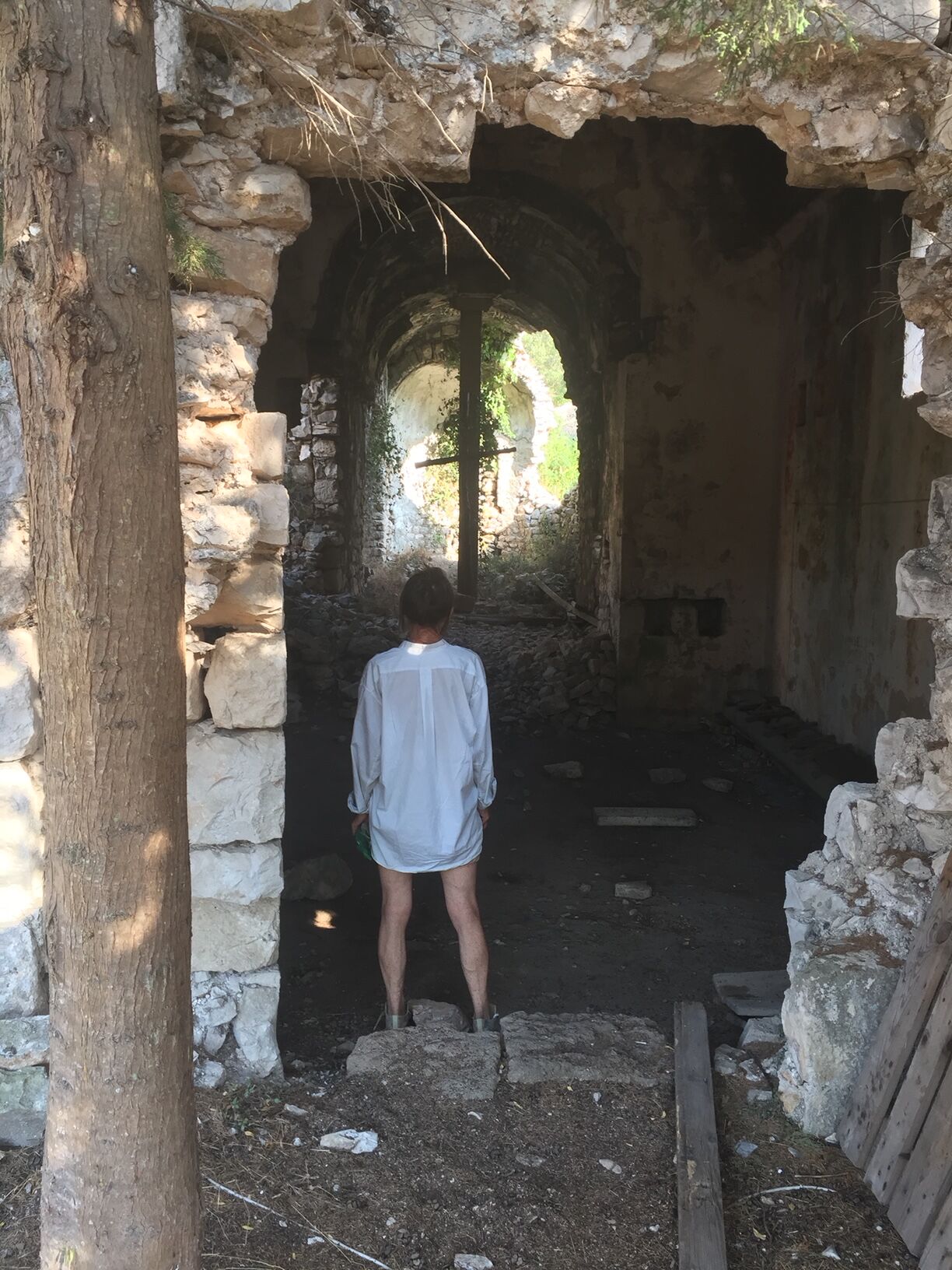Difference between revisions of "CONVERSATIONS"
m |
m |
||
| (502 intermediate revisions by the same user not shown) | |||
| Line 1: | Line 1: | ||
| − | <div class="page-header" > <h1>Federation through | + | <div class="page-header" ><h1>Federation through Action</h1> </div> |
| − | |||
| − | |||
| − | |||
<div class="row"> | <div class="row"> | ||
| − | + | <div class="col-md-3"></div> | |
| − | + | <div class="col-md-7"><p>In 1999 The Economist issued a challenge—to write an essay describing what the world would be like in 2050; I called my contribution "World in the year 2000". It is not possible to <em>predict</em> what the world will be like in 2050, I explained; but the answer will depend crucially on how we see the world and act <em>today</em>. I pointed to the diagnoses that we are headed towards a systemic "collapse"—where the <em><b>systems</b></em> in which we live and work collapse and topple one another like dominos; and concluded that our focus <em>now</em> needs to be on creating an embryonic <em>new</em> order of things or <em><b>paradigm</b></em>.</p> | |
| − | + | <h3>Which will transform the dynamic of collapse into the dynamic of renewal.</h3> | |
| − | + | <p>To achieve that, this action <em><b>prototype</b></em> doesn't need to be large.</p> | |
| − | + | <h3>But it <em>does</em> need to be <em>whole</em>.</h3> | |
| − | + | <p>I propose this minimal action plan, comprising only two parallel steps, as a sufficiently complete embryo—capable of engaging the <em><b>pivotal</b></em> forces of change; and scaling all the way to a <em><b>whole</b></em> new order; without falling back into old patterns of thought and action, and collapsing.</p> | |
| − | + | </div> </div> | |
| − | |||
| − | |||
| − | |||
| − | |||
| − | |||
| − | |||
| − | |||
| − | |||
| − | |||
| − | |||
| − | |||
| − | |||
| − | |||
| − | |||
| − | |||
| − | |||
| − | |||
| − | |||
| − | |||
| − | |||
| − | |||
| − | |||
| − | |||
| − | < | ||
| − | < | ||
| − | |||
| − | |||
| − | |||
| − | |||
| − | < | ||
| − | <p> | ||
| − | |||
| − | </div> | ||
| − | |||
<div class="row"> | <div class="row"> | ||
| − | <div class="col-md-3">< | + | <div class="col-md-3"><font size="+1">Institute <em><b>knowledge federation</b>.</em></font></div> |
| − | + | <div class="col-md-7"><p><em><b>Knowledge federation</b></em> will be the <em><b>academia</b></em>'s—and the society's—evolutionary organ; and an academically sanctioned <em><b>praxis</b></em>, akin to architecture and design, by which the <em>cultural</em> renewal or rebuilding will be achieved; and a practical way to to empower our next generation—and the next-generation scientists or academic researchers in particular—to be creative as their situation and their <em>world's</em> condition will necessitate; and take the academic tradition into a whole new evolutionary orbit.</p> | |
| − | <p>[[File: | + | <p>By instituting <em><b>knowledge federation</b></em> we'll activate <em>the</em> most powerful transforming force or "systemic leverage point"—<em><b>information</b></em>; so that the cultural renewal may draw strength from the university's prerogative to tell the world what <em><b>information</b></em> needs to be like; and how to rebuild the <em><b>foundation</b></em> for it all, and how to build further.</p> |
| − | <p> | + | <p>This can be—and perhaps <em>should</em> be—choreographed in a multitude of ways; our concrete plan, already in motion, is to institute <em><b>knowledge federation</b></em> at the Inter University Center Dubrovnik under the patronage of the World Academy of Art and Science; and begin to grow <em><b>transdisciplinarity</b></em> by offering the <em><b>collaborology</b></em> course to the students of IUC member institutions.</p> |
| + | <p>The Inter University Center has the world's leading universities as members; their students can take IUC courses for credit, with the consent of their departments. <em><b>Knowledge federation</b></em> was <em>born</em> at IUC, and through a series of biennial events made it its home. As a Renaissance town and a former republic—which has "Libertas" written on its flag—Dubrovnik is the natural catalyst for the processes we wish to ignite; and it happens to be the town where I too first saw the light of day.</p> | ||
| + | <p>The World Academy of Art and Science is an academic institution whose members are global change makers; selected because they <em>made a difference</em> in the world.</p> | ||
| + | <h3>Let's give them the option to be <em>Z-players</em>!</h3> | ||
| + | <p>Let's give them a way to use their power to empower <em>the next-generation talents</em> to change the world.</p> | ||
| + | <p> [[File:WAAS.jpg]] <br><small><center>Garry Jacobs, the WAAS President and CEO, presenting at our joint workshop in Sava Center Belgrade</center></small></p> | ||
| + | <p>At the joint workshop that <em><b>knowledge federation</b></em> had with the WAAS leaders in Sava Center Belgrade in 2017, after we've all shared our aspirations, I was able to conclude "You at WAAS have the mandate to (organize the global thought leades and) be the society's 'headlights'; and we in <em><b>knowledge federation</b></em>, we are 'lightbulb engineers'; let's collaborate! And I subsequently presented and discussed (with some of the WAAS leaders) the<em><b>collaborology prototype</b></em> at the WAAS <em>Future Education 2</em> conference in Rome.</p> | ||
</div> | </div> | ||
</div> | </div> | ||
| − | |||
<div class="row"> | <div class="row"> | ||
| − | + | <div class="col-md-3"><font size="+1">Ignite <em><b>holotopia dialog</b></em>.</font></div> | |
| − | <div class="col-md-7"><h3> | + | <div class="col-md-7"><p>The <em><b>holotopia dialog</b></em> is our new and evolving "public sphere", or <em><b>collective mind</b></em>—which will refocus our attention on <em><b>pivotal</b></em> themes; and elevate our understanding by co-creating transformative <em><b>insights</b></em>; and express them though a myriad artistic interventions, which will together constitute the <em><b>cultural renewal</b></em>.</p> |
| − | <p> | + | <p>The <em>Liberation</em> book is not intended to be conventional publication—but an instrument in an orchestra of media, which will constitute (the technological base for) the <em><b>dialog</b></em>; the purpose of the book is to <em>prime</em> the <em><b>dialog</b></em>; by offering food for thought. I intend to leave the book in draft for or in "permanent beta" forever; and let the <em><b>dialog</b></em> produce re-issues; and of course a variety of new books too; and of course—<em>not only</em> books!</p> |
| + | <p>Considering the importance of this line of work, you won't be surprised when I tell you that I've been developing it through <em><b>prototypes</b></em> all along; I called them <em><b>key point dialogs</b></em>, because each of them is a way in which a community of people can collectively walk to the metaphorical <em><b>mountain top</b></em> and find—and then also follow—a new direction.</p> | ||
| + | <h3>One of them is the Paradigm Strategy poster and dialog.</h3> | ||
| + | <p>Which we created for the Systemic Design Association's 2017 symposium in Oslo. And explained in the abstract that our motivation is "to allow for the kind of difference that is suggested by the comparison of everyone carrying buckets of water from their own basements, with everyone teaming up and building a dam to regulate the flow of the river that is causing the flooding. We offer to the systemic design community what we are calling The Paradigm Strategy as a way to make a similar difference in impact, with respect to the common efforts focusing on specific problems or issues. The Paradigm Strategy is to focus our efforts on instigating a sweeping and fundamental cultural and social paradigm change – instead of trying to solve problems, or discuss, understand and resolve issues."</p> | ||
| + | <p>[[File:PSwithFredrik.jpeg]]<br><small><center>Fredrik Eive Refsli, the leader of our communication design team, jubilates the completion of The Paradigm Strategy poster.</center></small></p> | ||
| + | <p>The Paradigm Strategy poster is an <em>interactive</em> poster, whose online documents can be accessed through QR codes. The poster was designed to engage the SD community to co-create with us a collective walk to an overarching vision—of the emerging <em><b>paradigm</b></em>. The poster applied the core elements of <em><b>polyscopic methodology</b></em> to engender a collective walk to a <em><b>mountain top</b></em>.</p> | ||
| + | <p>The <em><b>dialog</b></em> is not so much a conversation as it is an endlessly fertile creative space; where we'll create through artful and judicious use of technology, ever new ways to co-create and share <em><b>knowledge</b></em> about the themes that matter. But here I want to be concrete—so let me give you a flavor.</p> | ||
| + | <p>A few years ago I was sailing with a couple of friends off the coast of Croatia; and they said they'd introduce me to someone. Soon we docked on a tiny island called Šćedro, near the much larger island Hvar; where they introduced me to Irena Meier, a Croatian artist living in Switzerland; who owns a house and a small bay on Šćedro, with nobody around. With at least a dozen artistically created <em>conversation places</em>! Some of them were tiny, like this one:</p> | ||
| + | <p> [[File:Scedro-corner.jpg]] <br><small><center>A small conversation place on Šćedro</center></small></p> | ||
| + | <p>And some of them were large.</p> | ||
| + | <p> [[File:Scedro-table.jpg]] <br><small><center>A large conversation place on Šćedro </center></small></p> | ||
| + | <p>Right away I began planning a <em><b>holotopia dialog</b></em> in Irena's bay; and Irena readily joined me, as if she'd been waiting for that. In an adjacent bay, a short walk away, she showed me a church in ruin—as another location perfect for our purpose.</p> | ||
| + | <p> [[File:Scedro-church.jpg]] <br><small><center>A church ruin on Šćedro </center></small></p> | ||
| + | <p> And our purpose itself was emerging from our conversation, as we walked: The idea is to radically recreate the conventional "reality show"; where a selected handful of protagonists would spend several days on Šćedro with a film crew; and converse, in a variety of combinations; so that two "realities" would intertwine to compose the show—the realities of the world we live in; and our inner realities—where we experience resistance, a difficulty to grasp—and perhaps already the sense of empowerment and wonder that a large change invariably brings, when it is conscious.</p> | ||
| + | <p>I had a similar experience more recently here in Norway, while visiting the Venabu mountain hotel, which is still run by the same family who created it; where natural beauty mixes with cultural tradition to create a transformative experience. The plan is to gather a couple of dozen participants who have deep insight in distinct aspects of a pivotal theme, for a week or so; and have them sit together in a Bohm dialog circle—for an hour and a half after breakfast, and for forty-five minutes before dinner; and allow everyone to spend the rest of the time walking or skiing in nature—and reflecting.</p> | ||
| + | <h3> By default, the <em>dialogs</em> are recorded.</h3> | ||
| + | <p>A dialog can be almost anything and anywhere; you and I may be conversing over a cup of tea and even online—and record the conversation, and contribute it to the overall dialog. | ||
| + | What combines all those elvents together, into a single global dialog alias collective mind, is new media technology. And here we are fortunate, because David Price himself offered to guide and structure our co-creative process on DebateGraph. In this process we'll extract points from contributed materials, relate them to each other, and use them as dots to reach even higher-order points; on DebateGraph, our collective mind will be in a real sense thinking, and creating.</p> | ||
| + | <p>The <em><b>dialog</b></em> will create further books; and not only books—but a variety of artistic renditions of those <em><b>points</b></em> too.</p> | ||
| + | <h3>Isn't this <em>the</em> natural way for the cultural revival to unfold?</h3> | ||
| + | <p>And wasn't it exactly <em>art</em> (think of Boticelli; or Michelangelo) that gave to last cultural revival a recognizable shape?</p> | ||
| + | And here we do have a precursor, and a prototype—in Earth Sharing art installation and dialog; which Vibeke Jensen created in Gallery 3.14 in the old city core of Bergen; and invited me to step in as co-author. | ||
| + | </p> | ||
| + | <p> [[File:Local-Global.jpg]] <br><small><center>A detail from Earth Sharing installation</center></small></p> | ||
| + | <p>Imagine a (post-individualistic?) world where art is an integral part of the <em><b>collective mind</b></em>; where art begins where science ends—and gives <em>life</em> to <em><b>insights</b></em>! The art that Vibeke produced was of that kind. And she crafted also a <em>space</em> where creative dialog can bloom.</p> | ||
| + | <p> [[File:KunsthallDialog01.jpg]] <br><small><center>A co-creative dialog at Earth Sharing installation</center></small></p> | ||
| + | <p>We subsequently continued this co-creative process; and the <em><b>holotopia prototype</b></em> developed through our <em><b>dialog</b></em>.</p> | ||
| + | <p> [[File:Vibeke.jpg]] <br><small><center>[[Vibeke Jensen]] in her Berlin studio</center></small></p> | ||
| + | <p> I'll end with the <em><b>dialogs</b></em> I share with Noah; as the simplest yet arguably most important kind; because that <em><b>dialog</b></em> is a way—or <em>the</em> way for me to be a father. But two people are not enough.</p> | ||
| + | <h3>So if you have similar concerns—come join us!</h3> | ||
</div> | </div> | ||
</div> | </div> | ||
Latest revision as of 19:38, 2 January 2024
Contents
- 1 Federation through Action
- 1.1 Which will transform the dynamic of collapse into the dynamic of renewal.
- 1.2 But it does need to be whole.
- 1.3 Let's give them the option to be Z-players!
- 1.4 One of them is the Paradigm Strategy poster and dialog.
- 1.5 By default, the dialogs are recorded.
- 1.6 Isn't this the natural way for the cultural revival to unfold?
- 1.7 So if you have similar concerns—come join us!
Federation through Action
In 1999 The Economist issued a challenge—to write an essay describing what the world would be like in 2050; I called my contribution "World in the year 2000". It is not possible to predict what the world will be like in 2050, I explained; but the answer will depend crucially on how we see the world and act today. I pointed to the diagnoses that we are headed towards a systemic "collapse"—where the systems in which we live and work collapse and topple one another like dominos; and concluded that our focus now needs to be on creating an embryonic new order of things or paradigm.
Which will transform the dynamic of collapse into the dynamic of renewal.
To achieve that, this action prototype doesn't need to be large.
But it does need to be whole.
I propose this minimal action plan, comprising only two parallel steps, as a sufficiently complete embryo—capable of engaging the pivotal forces of change; and scaling all the way to a whole new order; without falling back into old patterns of thought and action, and collapsing.
Knowledge federation will be the academia's—and the society's—evolutionary organ; and an academically sanctioned praxis, akin to architecture and design, by which the cultural renewal or rebuilding will be achieved; and a practical way to to empower our next generation—and the next-generation scientists or academic researchers in particular—to be creative as their situation and their world's condition will necessitate; and take the academic tradition into a whole new evolutionary orbit.
By instituting knowledge federation we'll activate the most powerful transforming force or "systemic leverage point"—information; so that the cultural renewal may draw strength from the university's prerogative to tell the world what information needs to be like; and how to rebuild the foundation for it all, and how to build further.
This can be—and perhaps should be—choreographed in a multitude of ways; our concrete plan, already in motion, is to institute knowledge federation at the Inter University Center Dubrovnik under the patronage of the World Academy of Art and Science; and begin to grow transdisciplinarity by offering the collaborology course to the students of IUC member institutions.
The Inter University Center has the world's leading universities as members; their students can take IUC courses for credit, with the consent of their departments. Knowledge federation was born at IUC, and through a series of biennial events made it its home. As a Renaissance town and a former republic—which has "Libertas" written on its flag—Dubrovnik is the natural catalyst for the processes we wish to ignite; and it happens to be the town where I too first saw the light of day.
The World Academy of Art and Science is an academic institution whose members are global change makers; selected because they made a difference in the world.
Let's give them the option to be Z-players!
Let's give them a way to use their power to empower the next-generation talents to change the world.
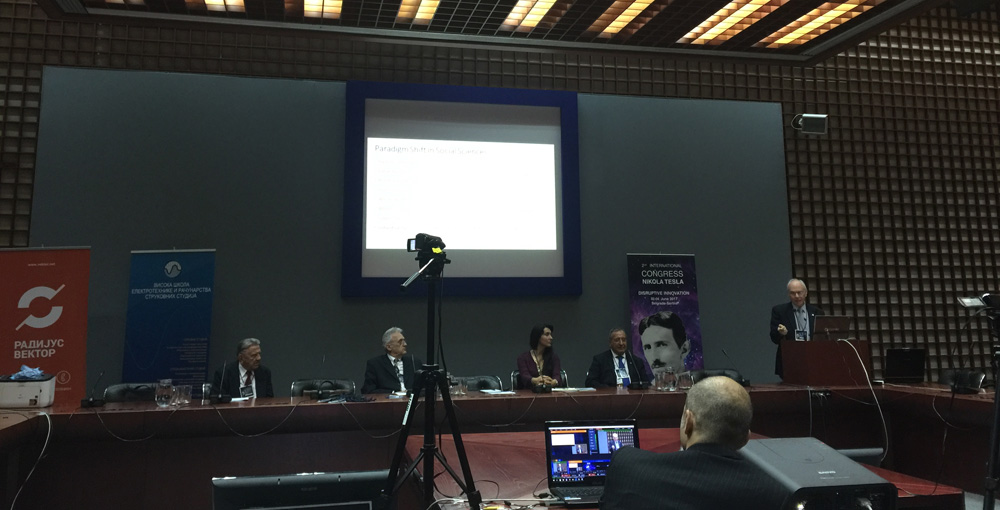
At the joint workshop that knowledge federation had with the WAAS leaders in Sava Center Belgrade in 2017, after we've all shared our aspirations, I was able to conclude "You at WAAS have the mandate to (organize the global thought leades and) be the society's 'headlights'; and we in knowledge federation, we are 'lightbulb engineers'; let's collaborate! And I subsequently presented and discussed (with some of the WAAS leaders) thecollaborology prototype at the WAAS Future Education 2 conference in Rome.
The holotopia dialog is our new and evolving "public sphere", or collective mind—which will refocus our attention on pivotal themes; and elevate our understanding by co-creating transformative insights; and express them though a myriad artistic interventions, which will together constitute the cultural renewal.
The Liberation book is not intended to be conventional publication—but an instrument in an orchestra of media, which will constitute (the technological base for) the dialog; the purpose of the book is to prime the dialog; by offering food for thought. I intend to leave the book in draft for or in "permanent beta" forever; and let the dialog produce re-issues; and of course a variety of new books too; and of course—not only books!
Considering the importance of this line of work, you won't be surprised when I tell you that I've been developing it through prototypes all along; I called them key point dialogs, because each of them is a way in which a community of people can collectively walk to the metaphorical mountain top and find—and then also follow—a new direction.
One of them is the Paradigm Strategy poster and dialog.
Which we created for the Systemic Design Association's 2017 symposium in Oslo. And explained in the abstract that our motivation is "to allow for the kind of difference that is suggested by the comparison of everyone carrying buckets of water from their own basements, with everyone teaming up and building a dam to regulate the flow of the river that is causing the flooding. We offer to the systemic design community what we are calling The Paradigm Strategy as a way to make a similar difference in impact, with respect to the common efforts focusing on specific problems or issues. The Paradigm Strategy is to focus our efforts on instigating a sweeping and fundamental cultural and social paradigm change – instead of trying to solve problems, or discuss, understand and resolve issues."
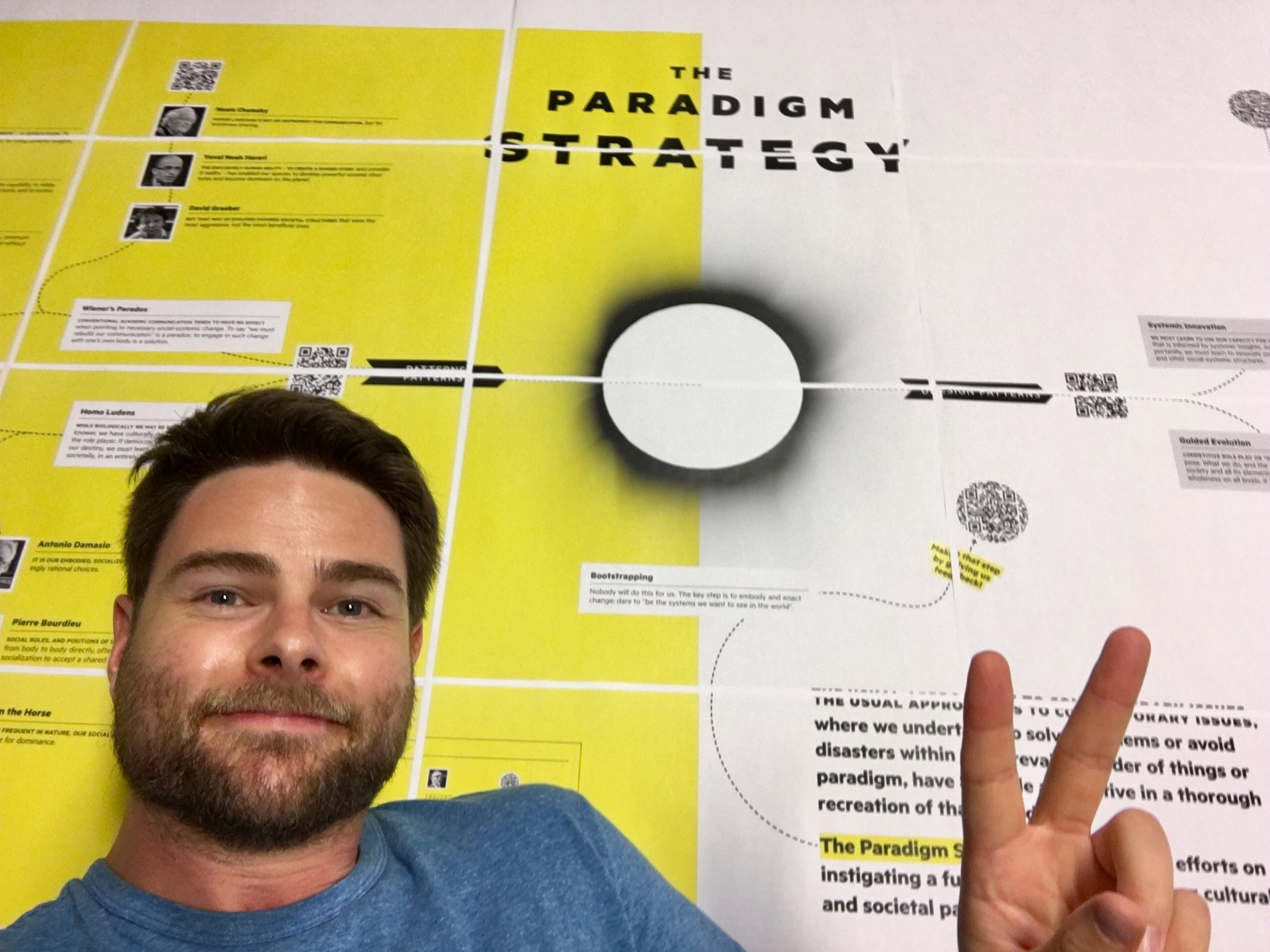
The Paradigm Strategy poster is an interactive poster, whose online documents can be accessed through QR codes. The poster was designed to engage the SD community to co-create with us a collective walk to an overarching vision—of the emerging paradigm. The poster applied the core elements of polyscopic methodology to engender a collective walk to a mountain top.
The dialog is not so much a conversation as it is an endlessly fertile creative space; where we'll create through artful and judicious use of technology, ever new ways to co-create and share knowledge about the themes that matter. But here I want to be concrete—so let me give you a flavor.
A few years ago I was sailing with a couple of friends off the coast of Croatia; and they said they'd introduce me to someone. Soon we docked on a tiny island called Šćedro, near the much larger island Hvar; where they introduced me to Irena Meier, a Croatian artist living in Switzerland; who owns a house and a small bay on Šćedro, with nobody around. With at least a dozen artistically created conversation places! Some of them were tiny, like this one:
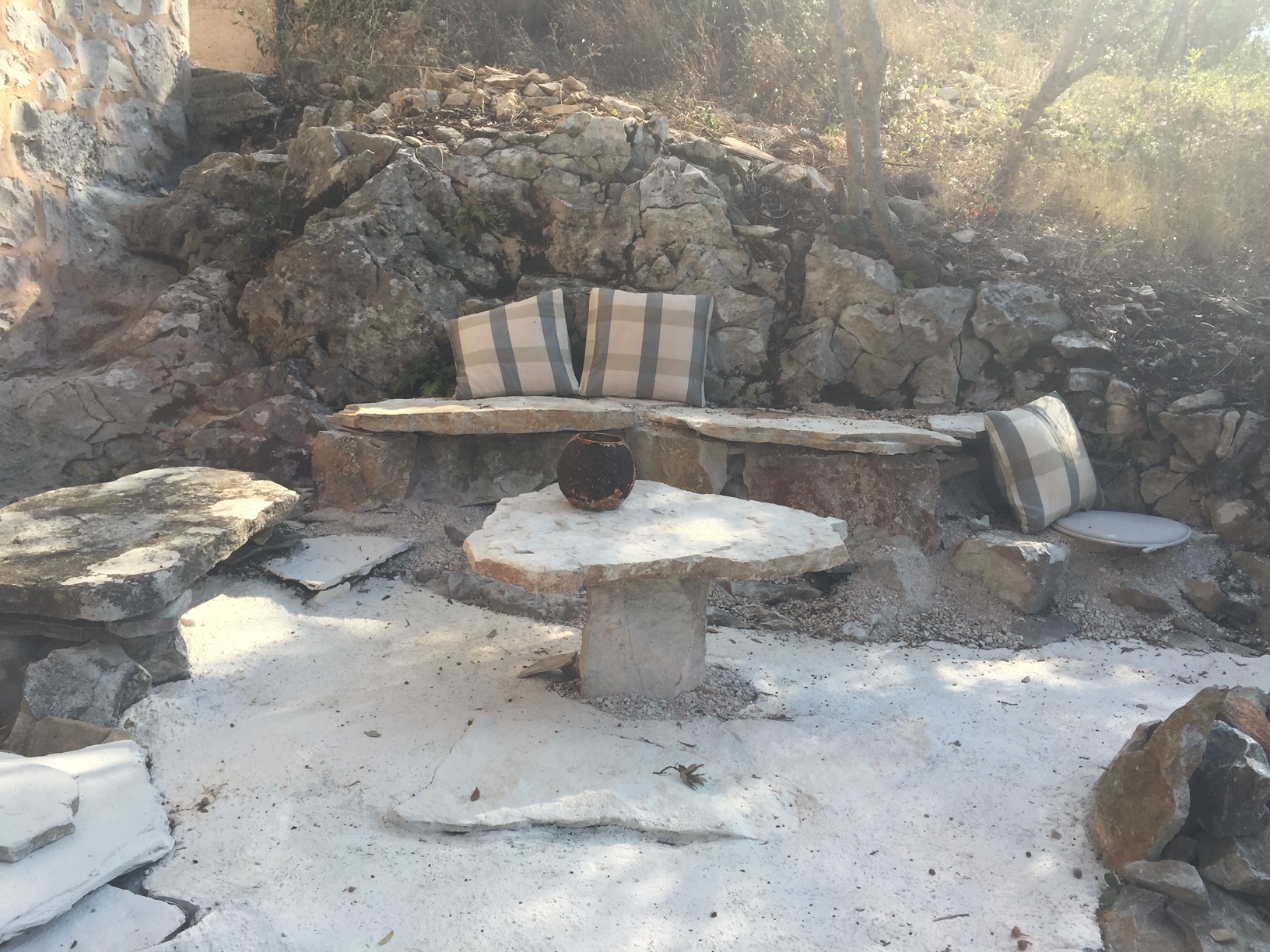
And some of them were large.
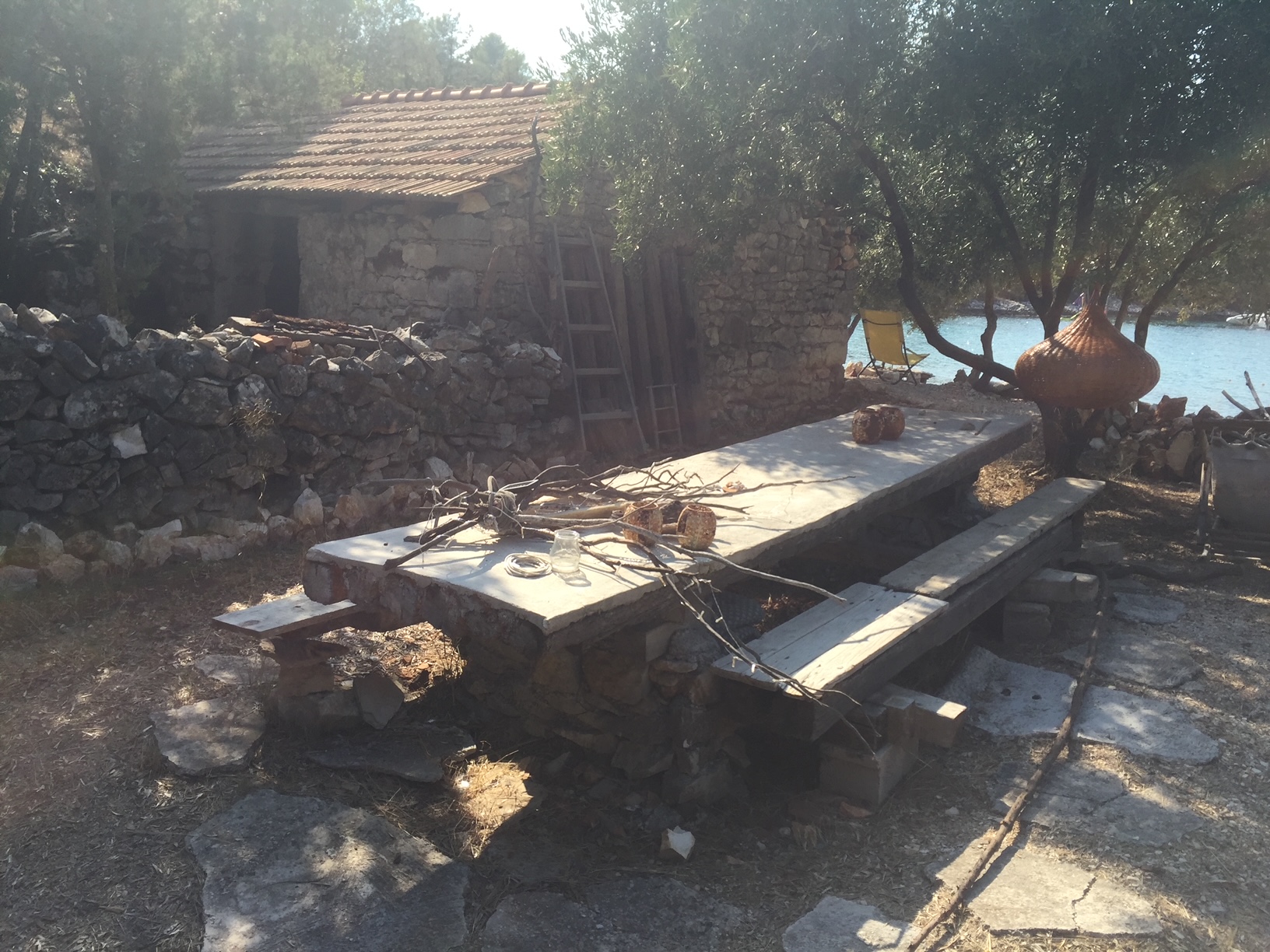
Right away I began planning a holotopia dialog in Irena's bay; and Irena readily joined me, as if she'd been waiting for that. In an adjacent bay, a short walk away, she showed me a church in ruin—as another location perfect for our purpose.
And our purpose itself was emerging from our conversation, as we walked: The idea is to radically recreate the conventional "reality show"; where a selected handful of protagonists would spend several days on Šćedro with a film crew; and converse, in a variety of combinations; so that two "realities" would intertwine to compose the show—the realities of the world we live in; and our inner realities—where we experience resistance, a difficulty to grasp—and perhaps already the sense of empowerment and wonder that a large change invariably brings, when it is conscious.
I had a similar experience more recently here in Norway, while visiting the Venabu mountain hotel, which is still run by the same family who created it; where natural beauty mixes with cultural tradition to create a transformative experience. The plan is to gather a couple of dozen participants who have deep insight in distinct aspects of a pivotal theme, for a week or so; and have them sit together in a Bohm dialog circle—for an hour and a half after breakfast, and for forty-five minutes before dinner; and allow everyone to spend the rest of the time walking or skiing in nature—and reflecting.
By default, the dialogs are recorded.
A dialog can be almost anything and anywhere; you and I may be conversing over a cup of tea and even online—and record the conversation, and contribute it to the overall dialog. What combines all those elvents together, into a single global dialog alias collective mind, is new media technology. And here we are fortunate, because David Price himself offered to guide and structure our co-creative process on DebateGraph. In this process we'll extract points from contributed materials, relate them to each other, and use them as dots to reach even higher-order points; on DebateGraph, our collective mind will be in a real sense thinking, and creating.
The dialog will create further books; and not only books—but a variety of artistic renditions of those points too.
Isn't this the natural way for the cultural revival to unfold?
And wasn't it exactly art (think of Boticelli; or Michelangelo) that gave to last cultural revival a recognizable shape?
And here we do have a precursor, and a prototype—in Earth Sharing art installation and dialog; which Vibeke Jensen created in Gallery 3.14 in the old city core of Bergen; and invited me to step in as co-author. </p>
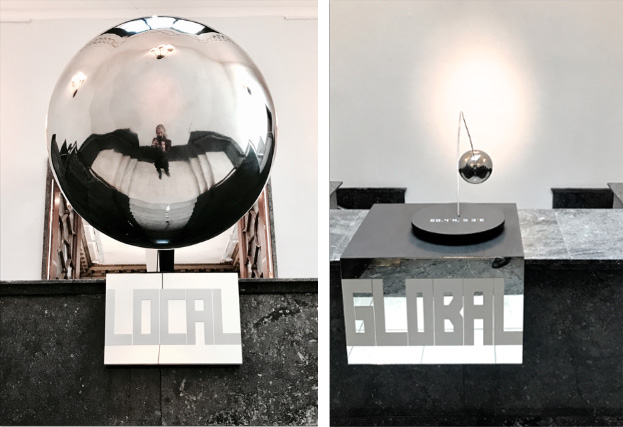
Imagine a (post-individualistic?) world where art is an integral part of the collective mind; where art begins where science ends—and gives life to insights! The art that Vibeke produced was of that kind. And she crafted also a space where creative dialog can bloom.
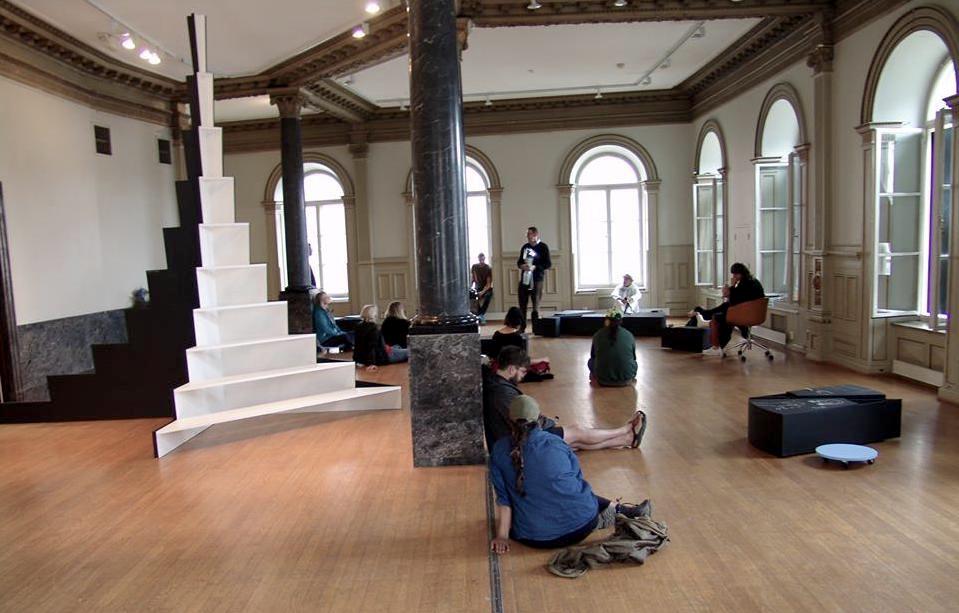
We subsequently continued this co-creative process; and the holotopia prototype developed through our dialog.
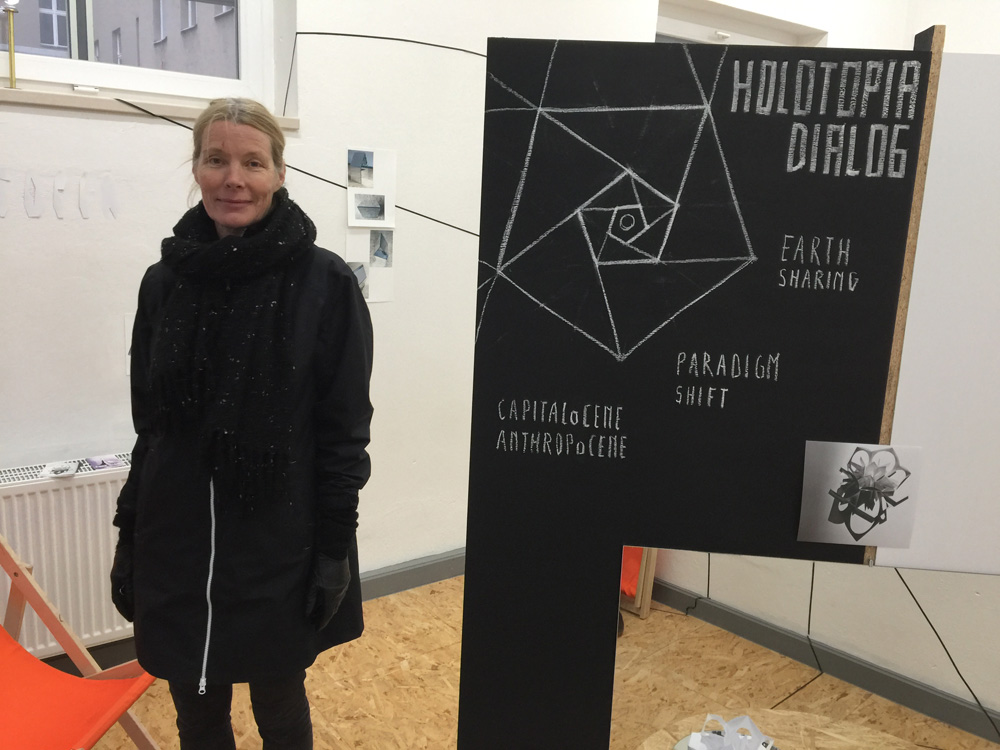
I'll end with the dialogs I share with Noah; as the simplest yet arguably most important kind; because that dialog is a way—or the way for me to be a father. But two people are not enough.

